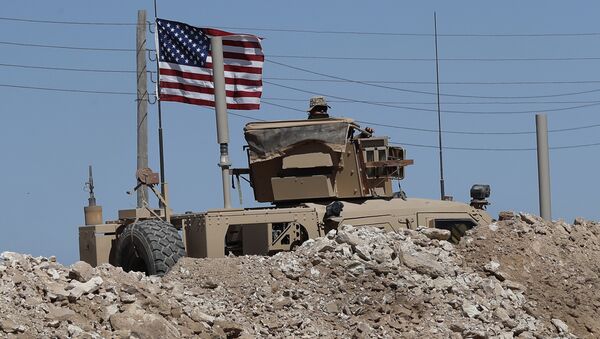Sputnik: What are your thoughts on the recent comment made by Trump, what consequences could it have?
Dr. Mohammed Nuruzzaman: The latest crisis situation over Syria is not unexpected; rather, it was in the making for some time, especially after Russia's direct intervention, which has effectively reversed the rebels' military and territorial gains. Two significant developments emerged after the fall of eastern Aleppo in late 2016:
a) Waning US strategic significance vis-à-vis the Iran-Russia-Syria alliance's growing dominance in Syria and the entire Middle East region;
and b) The near total elimination of the US and its allies — Saudi Arabia, Britain and France, from Syria, as symbolized by their latest defeat in Eastern Ghouta.
The US and the European powers hardly have any sympathy for the Saudi-supported Jaish al-Islam fighters; they were, in fact, looking for a bargaining chip, some kind of a menace to pressure the Bashar al-Assad government and its allies, Russia and Iran, to comply with their demands for negotiations to effect a favorable settlement of the war under the UN peace process. Their last military tool, Jaish al-Islam, is now crushed and hence they've pointed the finger at a chemical attack on the Islamist militants, without establishing who actually conducted this attack or whether it took place at all. There could be some other excuses, and possible fabrications as well.
READ MORE: Common Sense or Crying Havoc? Int'l Community Reacts to Looming US Op in Syria
Sputnik: Russia noted that a missile strike by the US could destroy all evidence of chemical weapons used in Syria; do you think this is the main aim of the US?
Dr. Mohammed Nuruzzaman: Tensions currently brewing up in Moscow-Washington relations are simply reflections of a US inability to digest Russia's and Iran's victory in Syria, which President Trump, through his characteristic tweets, is threatening to deny. More appalling to him is the imminent collapse of the so-called pro-US Middle East regional order, propped up by Israel and Saudi Arabia.
So the war rhetoric is flying high. That does not necessarily mean the possibility of a full-scale war between the US and Russia. Yet, some limited-scale engagement, some sort of a managed confrontation, cannot be totally ruled out.
Much depends on how Russia and Iran respond to Trump's much publicized threats of airstrikes on Syria. There was no firm Iran-Russia response to Trump's decision to fire cruise missiles at a Syrian airbase last year. In a worst case scenario, a full-scale war will ensue only if the US and its European and Middle Eastern allies attempt to roll up Iran-Russia military gains and seriously threaten the survival of the Bashar al-Assad government in Damascus.
READ MORE: 'The US Aim is to Attack Russia Not Syria'- Political Analyst
Sputnik: Russia has stated that it would shoot down US missiles fired over Syria, could this lead to a possible US-Russia confrontation?
Dr. Mohammed Nuruzzaman: Wherever the US troops go, they hardly ever leave that country unless forced to do so. Defeat in Vietnam and withdrawal from Iraq under pressure by the end of 2011 are exceptions. It is unlikely that President Trump, despite his sensational statements on a withdrawal from eastern Syria, will follow up on his own announcement. There are other bottlenecks, particularly the so-called "deep state" in America, the military-industrial complex and so on that will stand in the way to increase their margin of profits from the Syrian and other conflicts in the Middle East. The intensity of Turkey's war on the Syrian Kurds may also negatively influence Trump's withdrawal decision.
The views and opinions expressed by the contributors do not necessarily reflect those of Sputnik.



